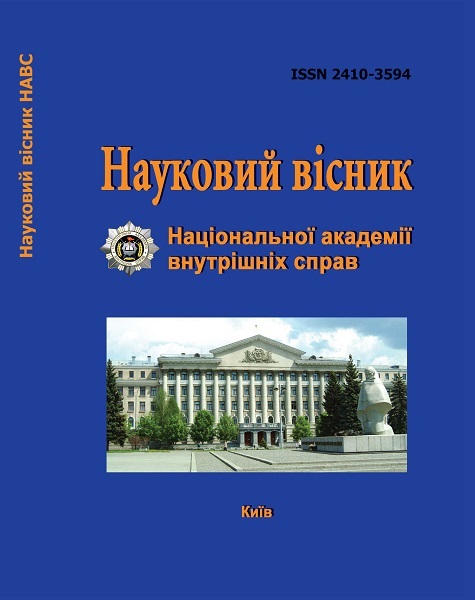Laws and Administrative Measures on Information Services of the Ministry of Internal Affairs of Ukraine
Abstract
The article covers the topical issues of the analysis of the legal and regulatory framework of the state communicative policy, the main goals, functions and tasks of the information services of the Ministry of Internal Affairs of Ukraine, the effectiveness of the use of information systems in the activity of law enforcement bodies, the use of information and communication technologies in the implementation of tasks by law enforcement bodies of the Ministry of Internal Affairs. The orientation of civil society, the course on the association of Ukraine with the European Union and the realities of the socio-political situation in the state significantly increased the requirements for the provision of professional services by law enforcement agencies. Openness and publicity are the main principles of the activities of the units of the National Police. The conceptual ideas of humanizing the activities of the police reinforce the partnership model of police and society relations, the legislator takes into account the necessity of observance of human and citizenʼs rights and freedoms, and ensuring the security of the individual. Full performance of the functions of the units of the National Police of Ukraine is impossible without proper information support, coordinating, co-ordinating and co-operating efforts to identify and achieve the objectives of the fight against crime through its assistance. Information services of the Ministry of Internal Affairs of Ukraine provide information support to practical units in the disclosure and prevention of crime, the establishment and tracing of criminals, provide multi-purpose statistical, analytical and background information. A prerequisite for increasing the effectiveness of using information systems in law enforcement agencies is the search for fundamentally new ways of organizing work with information resources, the standardization of which is aimed at creating and harmonizing a single information space of law enforcement bodies necessary for obtaining in real time basic information necessary for integrated information criminal offenses and those who committed them. Infrastructure of the information services of the Ministry of Internal Affairs of Ukraine is diverse and ramified, which is connected with such main factors as: territorial branching; availability of a wide range of information carriers; variety of information by type and legal access regime circulating in practical units; the existence of a large number of external sources of information. For effective functioning of the information services of the Ministry of Internal Affairs, it is considered necessary to continuously monitor the problem aspects of professional activity, study normative documents, technical developments in the field of informatization and computer technologies, use of the latest information and software resources, methodological improvement of activities, practical training and retraining of specialists on the basis of European standards.
Downloads
Abstract views: 165 PDF Downloads: 68
- Authors reserve the right to authorship of their own work and transfer to the magazine the right of the first publication of this work under the terms of the Creative Commons Attribution License, which allows other persons to freely distribute published work with mandatory reference to authors of the original work and the first publication of an article in this magazine.
- Authors have the right to enter into separate additional agreements on non-exclusive dissemination of the work in the form in which it was published in the journal (for example, to post an article in the institution's repository or to publish as part of a monograph), provided that the link to the first publication of the work in this journal is maintained.
- The journal's policy allows and encourages the posting of articles by authors on the Internet (for example, in electronic storehouses of institutions or on personal websites), both before the submission of this manuscript to the editorial office and during its editorial processing, as this contributes to the creation of a productive scientific discussion and positively affects the efficiency and dynamics of citing the published work.




